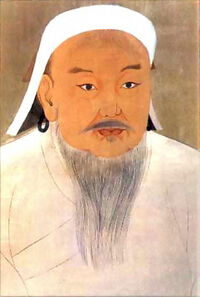Ögedei Khan, (Mongolian: Өгөөдэй, Ögöödei; Chinese: 窝阔台; pinyin: Wōkuòtái; also Ogotai or Oktay; c. 1186 – 1241), was the third son of Genghis Khan and second Great Khan of the Mongol Empire by succeeding his father. He continued the expansion of the empire that his father had begun, and was the Great Khan when the Mongol Empire reached its furthest extent west during the invasion of Europe. Like all of Genghis' primary sons, he participated extensively in conquests in Western China and Central Asia.
 Ascendancy to Supreme Khan
Ascendancy to Supreme KhanÖgedei's death in 1241, brought the Mongol invasion of Europe to a premature end. The commanders heard the news as they were advancing on Vienna, and withdrew for the Ikh kurultai in Mongolia, never again to return so far west.
His son Güyük eventually succeeded him after the five-year regency of his widow Töregene Khatun. But Batu Khan, Khan of the Kipchak Khanate in Russia, never accepted Guyuk, who died on the way to confront him. It was not until 1255, well into the reign of Mongke Khan, that Batu felt secure enough to again prepare to invade Europe. Fortunately for the Europeans, he died before his plans could be implemented. His son intended to carry them out, but he also died, and in 1258, Batu's brother Berke, ascended to the Kipchak Khanate. A Muslim, he was more interested in stopping his cousin Hulagu from doing any more damage to the Holy Land than invading Europe. Historians mark the decline of the united Mongol Empire from Ogedei's death, though Mongke's ascension halted the interfamilial fighting for a time.